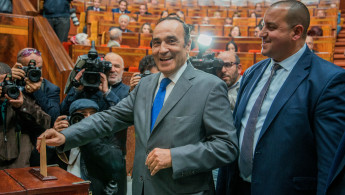Morocco parliament elects speaker in absence of new government
Sole candidate Habib el-Malki, a leftist economist who has held several ministerial posts, mustered 198 votes in the 395-seat house, in a plenary session broadcast live online.
King Mohammed VI has called on parliament to ratify laws by Friday to clear the way for Morocco's return to the African Union at a summit in Addis Ababa at the end of January, according to legislators.
The country, however, is in an unprecedented political deadlock after its Islamist premier, Abdelilah Benkirane, last week broke off talks on forming a new coalition government following three months of fruitless efforts.
The political impasse – apparently rooted in a power struggle between the Islamist Justice and Development Party (PJD) and figures close to the royal palace – threatens to provoke a political crisis and possibly even new elections.
King Mohammed VI tasked Benkirane with forming a new government after his PJD won the most seats in October elections.
The PJD rose to power after the king relinquished some of his near-absolute power following Arab Spring-inspired protests in 2011, with Benkirane heading a previous coalition government for five years.
The PJD faced a serious challenge in October's vote from the secularist Authenticity and Modernity Party (PAM), which campaigned against the "Islamisation" of Moroccan society and came a strong second.
Since the vote Benkirane has been haggling to rebuild his coalition, which had brought together a range of parties including other Islamists, liberals and ex-Communists.
But he has proven unable to secure the 198 of 395 seats needed for a majority and in a surprise statement on Sunday said he was breaking off talks with two parties, the centre-right National Rally of Independence (RNI) and the Popular Movement (MP).
Meanwhile Rabat seeks a return to the African Union after more than three decades since quitting in protest at the bloc's decision to accept the disputed territory of Western Sahara as a member.
In a diplomatic offensive to drum up support for its return, the king toured several African countries last year.
Morocco quit what was then called the Organisation of African Unity in 1984 over the admission of the Sahrawi Arab Democratic Republic declared by the Algiers-backed Polisario independence movement.
Rabat's return to the AU, opposed by Algeria, needs the support of two-thirds of the bloc's members, or at least 36.
Agencies contributed to this report





 Follow the Middle East's top stories in English at The New Arab on Google News
Follow the Middle East's top stories in English at The New Arab on Google News
![The UAE is widely suspected of arming the RSF militia [Getty]](/sites/default/files/styles/image_330x185/public/2024-11/GettyImages-472529908.jpg?h=69f2b9d0&itok=Yauw3YTG)
![Netanyahu furiously denounced the ICC [Getty]](/sites/default/files/styles/image_330x185/public/2024-11/GettyImages-2169352575.jpg?h=199d8c1f&itok=-vRiruf5)
![Both Hamas and the Palestinian Authority welcomed the ICC arrest warrants [Getty]](/sites/default/files/styles/image_330x185/public/2024-11/GettyImages-2178351173.jpg?h=199d8c1f&itok=TV858iVg)